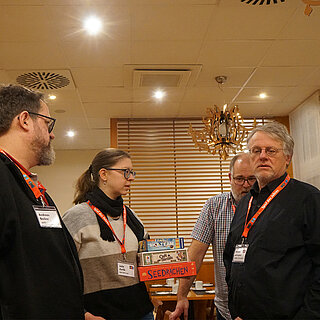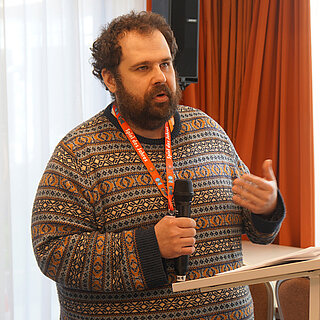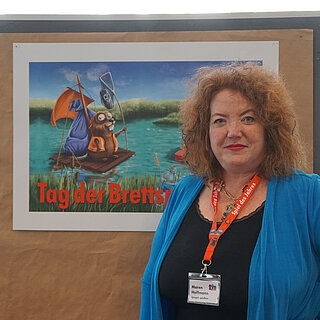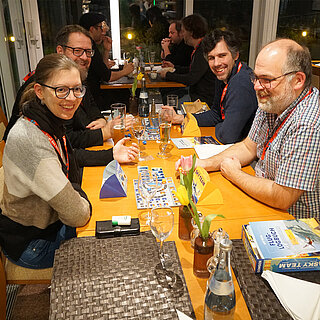
Board Game Criticism Day
The Spiel des Jahres (Game of the Year) association promotes the sector with a top-class advanced training
“If you expose yourself in public as a critic, then you have to face some criticism yourself.” This was the clear message with which host and Spiel des Jahres Managing Director Guido Heinecke inaugurated the Board Game Criticism Day. The common goal of the day was self-reflection and continuing professional development. That was why the Association of Board Game Journalists, which has been awarding the Spiel des Jahres (Game of the Year) prize in three categories since 1979, launched the Board Game Criticism Day. This year, the advanced training took place for the third time since 2019 in Mannheim on the weekend of 8 to 10 March 2024. A total of 75 media professionals involved in print, blogs, vlogs and podcasts took part.
The Board Game Criticism weekend: learning, discussing and, above all, playing

No sooner had the first people arrived at the Delta Park Hotel in Mannheim than they had already hijacked the bar tables and available seats – and unpacked their games. When Harald Schrapers, game critic and chairman of the association since 2018, greeted the attendees, gaming was already in full swing. Just as Harald Schrapers said two days later in his closing words to everyone who had attended: “Naturally, games are a cultural asset, but what’s even more important is the cultural asset of playing games. That is our unique selling point; and games can only be experienced in other people’s company.”
In total, 75 critics of the board game as a cultural asset met up for an entire weekend, but don’t imagine that things were all cosy and touchy-feely. After all, the weekend focussed on one particular aspect: the fact that everyone wants to get better, write better, film better and tackle various topics. Nevertheless, the weekend had some things in common with the Game of the Year convention of 2023: the game criticism clique consists of a lot of people all co-operating with each other (unless the game is played to win) and who act as equals. After all, they’re fighting to achieve one big, common goal: to establish the breakthrough of play as a universally accepted cultural asset (just like literature, theatre, film, etc.). In any event, there’s no lack of one important characteristic relating to “cultural assets”: just like established literary, theatre or film critics, colleagues in the board game industry are also well informed. Nearly everyone has the canon of board game history down pat, and has played, assessed and discussed everything. In the evening, when the boxes containing the treasured crop of this year’s games were immediately taken out after dinner, it became apparent that a lot of those present had also played the very latest games. Keeping up with the state-of-the-art has always been a natural obligation for critics.
A focussed working atmosphere: professional tips for the toolbox

“The Day of Board Game Criticism was not just a special kind of get-together, but also a technical levelling-up,” said Guido Heinecke in a review: the demands placed on the critics were similarly high. This was something that the speaker Efka Bladukas also made clear with his question “What do we owe our audience?” The man from Klaipėda, a harbour town in Lithuania, now lives with his wife Elaine in Nottingham, the UK. In his videos, he sometimes comes across as the clown of the industry, but, as with all great clowns, his approach is both serious and truthful, and his questions to the community are at times outrageous: “Can a Board Game Save the World?” is the title of one of his videos. The game reviews and features have been compiled and published under the heading “No Pun Included”. Efka’s challenge, delivered with gestures and drama, gets to the heart of the matter: “Board games must always be understood in a cultural context.”
Guido Heinecke also professes to want to improve what is good by demanding that games critics take the leading critics in the literary and theatre scene as their role model. They have always had lively arguments, referred to each other’s work, written about each other – in contrast to board game critics. “Our blogs and magazines in the board game scene don’t comment on each other in the slightest; they don’t even put their contributions into context. It’s like looking into a sky full of soap bubbles. Do the vast majority of bloggers, YouTubers, podcasters and magazine writers live an isolated life in their own bubble and are not interested in the others?” The succinct answer is “I think so.”
A number of well-known speakers were on hand to revamp the toolboxes of board game critics. Maren Hoffmann, a jury member for Spiel des Jahres, among others, writes for the German weekly journal Der Spiegel and believes that “short texts should sparkle”. Nothing less than “diamond cut” is her benchmark. However, the description of how this is achieved at Der Spiegel is sobering: who has an entire editorial team of top-class colleagues at their disposal who relentlessly scrutinise their own texts and don’t hold back with harsh internal criticism? The only thing that would help the lone wolves of board game reviews is tireless, self-taught professional development along with networking that would permit mutual improvement through criticism. All freelancers in the field of journalism are familiar with this problem.
Andreas Becker is one of the few people who have a permanent job that’s exclusively devoted to games. The editor-in-chief of the industry magazine spielbox has brought along a number of board game reviews that have been submitted and isn’t afraid to use specific examples to show that, in his practice, there’s plenty of room for improvement at all levels – linguistically and grammatically. Daniel Wüllner, responsible for social media and reader support at the Süddeutsche Zeitung newspaper, occasionally writes about board games, comics and series. His practical tip, which is pragmatic and easy to apply, is this: “When writing a game review, start with a clear conclusion to pique the reader’s interest.”
Board game vlogs, blogs, podcasts, reviews: writing out of passion for games

People who publish board game reviews are engaged in a profession with no recognised job profile. But that doesn’t mean that the people involved aren’t in it for the long haul. Even if only a handful can make a living from this demanding activity, it’s still a business whose end results may come across as nimble and elegant, but which are nevertheless pursued with great effort. Quite a few of the board game critics present are professional journalists, albeit from sectors that have nothing to do with games: Maren Hoffmann (“Job and Career” section at Der Spiegel), Dr Lino Wirag (social media for utopia.de and oekotest.de), Nicola Balkenhol (Deutschlandradio) and SWR radio journalist Fabian Ziehe are among them. Udo Bartsch, a veteran jury member and editor-in-chief of games magazine Spiel doch! from the Nostheide Verlag publishing company, runs the blog Rezensionen für Millionen (Reviews for Millions) and writes on a freelance basis for anyone interested in games criticism.
Most board game critics write their reviews in their spare time. Julia and Stephan Zerlik, she a primary school teacher lecturing at the University of Frankfurt and her husband, a media designer for sound and vision, combine their professional skills and passion for board games in highly regarded video blogs that no researcher can ignore. Petra Fuchs heads the Jung und Alt spielt games association, runs a youth centre, blogs on game reviews and is also writing her dissertation (“Playfully motivating the transfer of knowledge in the teaching of social work”). Quite a few of the attendees teach at universities and are academically involved with the topic of playing and games in their doctoral theses; this applies to seminar participants as well as the invited speakers: Sarah Klöfer, Valentin Köberlein, Anna Falke – mentions that are, like all the rest, cursory and incomplete. Tim Billen from Teilzeithelden, an online magazine for played and experienced fantasy, is representative of this diversity, selection of topics and quality standards. In his “civilian job”, he’s in charge of digital novels at the Bastei Lübbe publishing company.
Board games and diversity

There is, therefore, no lack of professionalism; the board game critic as such – a job that doesn’t really exist – has a level of education that’s far above the average. One question that could only be touched on briefly due to the lack of time was posed by Dr Wiebke Waburg, a professor of education at the University of Koblenz: how do board game publishers and authors handle modern demands for diversity – which means much more than just considering male and female roles in the game scenario? In fact, the entire spectrum of diverse lifestyles is something that can be analysed in a game: who is adequately represented and portrayed and how are origin, age, class, gender and gender identity, sexual orientation, physical and mental abilities along with religion and ideology represented? Body shapes also form part of this debate. This is a topic that will be the subject of a separate article here.
Last not least: the games that were played

Like birds of a feather, board gamers also quickly flock together. Despite the fact that the tables hadn’t yet been cleared after dinner, cardboard boxes were pulled out. What were they playing? When critics get together, they don’t play old favourites. “A selection, only from the current year,” explained Julia Zerlik from the Spiel des Jahres jury.
Wandering between the tables, we met Valentin Köberlein, a research assistant at the University of Constance, who was explaining Mycelia, an easy-to-learn yet challenging family game that involves removing drops of water from various plants in the natural world.
Udo Bartsch said that five games were tried out at his table on the first evening, his personal favourite being Passt nicht!, an entertaining, fast-paced card game thought up by Thomas Weber.
In particular, the colleagues from SpieleMA e. V., a free board game lending library in Mannheim, brought along the selection for the weekend: “As far as I can judge, the board game Heat, which was nominated for the German Games Award last year, was very popular. But games fresh off the press such as Vale of Eternity or Ku-Ka-König also attracted an audience. Everything was played – from fun party games to really difficult mind-bogglers,” said Jan Dotzlaw, summing up his observations for us.
About the Spiel des Jahres association
In February 1978, a group of independent game critics met at a private get-together near Nuremberg shortly before the opening of the Spielwarenmesse. Some well-known names from the industry were there – including the host Tom Werneck; game critic and collector Bernward Thole (see German Games Archive Nuremberg, the first chairman of the association from 1979 to 1994); game inventor Alex Randolph, who died in 2004... and Jürgen Herz, who had the idea of having a Spiel des Jahres, or “Game of the Year”, chosen by independent critics. This kicked off in 1979 and since 2001 the Children’s Game of the Year has also been awarded. Since 2011, the jury has awarded a third main prize: the Kennerspiel des Jahres or “Connoisseur Game of the Year”.
At present, the 15 voting members of the association belong to either the Game of the Year and Connoisseur Game of the Year jury or the Children’s Game of the Year jury. There are also three advisory members of the association. The association has been chaired by Duisburg-based specialised journalist Harald Schrapers (spielbox) since 2018. Its current managing director is Guido Heinecke. The association was founded in Nuremberg and it is headquartered in Kerpen near Cologne.
The jury’s work and the Spiel des Jahres awards have given a boost to the entire board game industry – both as regards the sales figures for games as well as the recognition of games and playing in culture.
The key dates for the Spiel des Jahres association in 2024
Tuesday, 11 June 2024, 4 pm: announcement of the recommendation and nomination lists: Game of the Year, Children’s Game of the Year and Connoisseur Game of the Year 2024
Sunday, 21 July 2024, 6 pm: award ceremony of Game, Children’s Game, Connoisseur Game of the Year 2024 | nhow Music Hall| Berlin
3 to 6 October 2024: Exhibition stand at SPIEL Essen | Hall 5 Stand M136 | Congress Centre Essen
Go to further dates in 2024
About the author Peter Budig
Peter Budig studied Protestant theology, history and political science. He worked as a freelance journalist, headed up the editorial department of a large advertising paper in Nuremberg for ten years and was the editor of Nuremberg’s Abendzeitung newspaper. He has been freelancing again since 2014 as a journalist, book author and copywriter. Storytelling is absolutely his favourite form.




![[Translate to Englisch:] [Translate to Englisch:]](/fileadmin/_processed_/e/9/csm_Teaser_dee2d790b8.png)